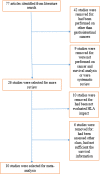The role of Human leukocyte antigen class I on patient survival in Gastrointestinal cancers: a systematic review and meta- analysis
- PMID: 31959894
- PMCID: PMC6970991
- DOI: 10.1038/s41598-020-57582-x
The role of Human leukocyte antigen class I on patient survival in Gastrointestinal cancers: a systematic review and meta- analysis
Abstract
The prognostic role of Human leukocyte antigen class I (HLA- I) in gastrointestinal cancers has been remained controversial. We performed a meta-analysis to determine the role of classical HLA-I in predicting survival of patients. In addition, the relationship between HLA- I and some clinicopathological factors was evaluated. Published studies investigated HLA-I expression effect on gastrointestinal cancers were evaluated to determine association between HLA- I and overall survival (OS) and recurrence-free survival (RFS) in patients. The used effect sizes were hazard ratio (HR) and Odds ratio (OR) with 95% confidence interval (CI). A total of ten studies included 1307 patients were analyzed. The pooled results revealed that HLA- I overexpression was positively related to OS (HR: 0.72; 95% CI: 0.53-0.96) and demonstrated little association for RFS (HR: 0.70; 95% CI: 0.46-1.08). HLA-I overexpression is negative associated with poorer differentiation of tumor (OR: 0.53; 95% CI (0.43-0.81) and also higher stages of cancer (OR: 0.29; 95% CI (0.13-0.64). HLA- I overexpression was related to a better prognosis on OS and probably had little impact on RFS.
Conflict of interest statement
The authors declare no competing interests.
Figures



Similar articles
-
Overexpression of LncRNA PVT1 Predicts Advanced Clinicopathological Features and Serves as an Unfavorable Risk Factor for Survival of Patients with Gastrointestinal Cancers.Cell Physiol Biochem. 2017;43(3):1077-1089. doi: 10.1159/000481719. Epub 2017 Oct 4. Cell Physiol Biochem. 2017. PMID: 28968599
-
The prognostic value of HOTAIR for predicting long-term prognosis of patients with gastrointestinal cancers.Medicine (Baltimore). 2018 Jun;97(26):e11139. doi: 10.1097/MD.0000000000011139. Medicine (Baltimore). 2018. PMID: 29952959 Free PMC article. Review.
-
Astrocyte Elevated Gene-1 as a Novel Clinicopathological and Prognostic Biomarker for Gastrointestinal Cancers: A Meta-Analysis with 2999 Patients.PLoS One. 2015 Dec 28;10(12):e0145659. doi: 10.1371/journal.pone.0145659. eCollection 2015. PLoS One. 2015. PMID: 26710214 Free PMC article.
-
HLA-I and breast cancer prognosis: A systematic review and meta-analysis.Hum Immunol. 2024 Nov;85(6):111148. doi: 10.1016/j.humimm.2024.111148. Epub 2024 Sep 24. Hum Immunol. 2024. PMID: 39321712
-
Human leucocyte antigen class I in hormone receptor-positive, HER2-negative breast cancer: association with response and survival after neoadjuvant chemotherapy.Breast Cancer Res. 2019 Dec 11;21(1):142. doi: 10.1186/s13058-019-1231-z. Breast Cancer Res. 2019. PMID: 31829264 Free PMC article.
Cited by
-
Expression of HLA class I is associated with immune cell infiltration and patient outcome in breast cancer.Sci Rep. 2022 Nov 27;12(1):20367. doi: 10.1038/s41598-022-24890-3. Sci Rep. 2022. PMID: 36437379 Free PMC article.
-
The Prognostic Significance of NEDD9 Expression in Human Cancers: A Systematic Review, Meta-Analysis, and Omics Exploration.Technol Cancer Res Treat. 2024 Jan-Dec;23:15330338241297597. doi: 10.1177/15330338241297597. Technol Cancer Res Treat. 2024. PMID: 39540210 Free PMC article.
-
Distinct Responsiveness of Tumor-Associated Macrophages to Immunotherapy of Tumors with Different Mechanisms of Major Histocompatibility Complex Class I Downregulation.Cancers (Basel). 2021 Jun 19;13(12):3057. doi: 10.3390/cancers13123057. Cancers (Basel). 2021. PMID: 34205330 Free PMC article.
-
HLAPepBinder: An Ensemble Model for The Prediction Of HLA-Peptide Binding.Iran J Biotechnol. 2024 Oct 1;22(4):e3927. doi: 10.30498/ijb.2024.459448.3927. eCollection 2024 Oct. Iran J Biotechnol. 2024. PMID: 40225296 Free PMC article.
-
Potential Molecular Markers Related to Lymph Node Metastasis and Stalk Resection Margins in Pedunculated T1 Colorectal Cancers Using Digital Spatial Profiling: A Pilot Study with a Small Case Series.Int J Mol Sci. 2024 Jan 16;25(2):1103. doi: 10.3390/ijms25021103. Int J Mol Sci. 2024. PMID: 38256174 Free PMC article.
References
-
- Marincola, F. M., Jaffee, E. M., Hicklin, D. J. & Ferrone, S. Escape of human solid tumors from T–cell recognition: Molecular mechanisms and functional significance. In Advances in immunology, Vol. 74 181–273 (Elsevier, 1999). - PubMed
Publication types
MeSH terms
Substances
LinkOut - more resources
Full Text Sources
Research Materials

